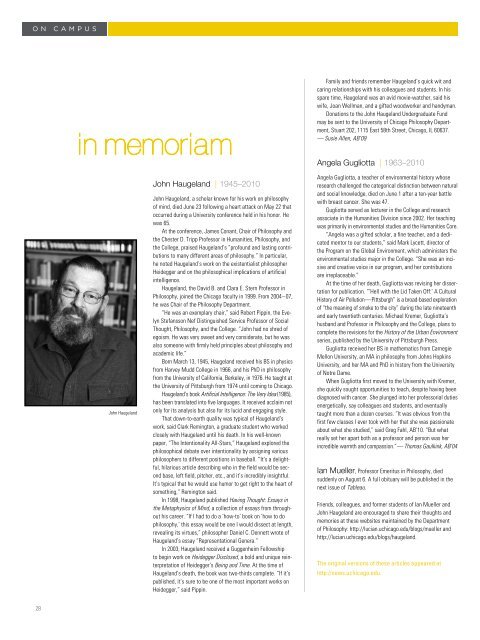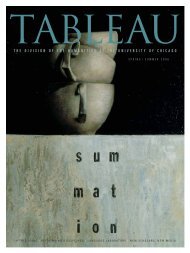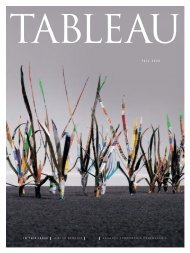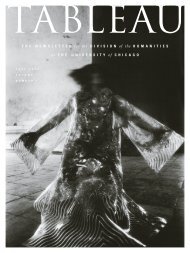Download this issue. - Tableau - University of Chicago
Download this issue. - Tableau - University of Chicago
Download this issue. - Tableau - University of Chicago
- No tags were found...
Create successful ePaper yourself
Turn your PDF publications into a flip-book with our unique Google optimized e-Paper software.
o n c a m p u s<br />
in memoriam<br />
Family and friends remember Haugeland’s quick wit and<br />
caring relationships with his colleagues and students. In his<br />
spare time, Haugeland was an avid movie-watcher, said his<br />
wife, Joan Wellman, and a gifted woodworker and handyman.<br />
Donations to the John Haugeland Undergraduate Fund<br />
may be sent to the <strong>University</strong> <strong>of</strong> <strong>Chicago</strong> Philosophy Department,<br />
Stuart 202, 1115 East 58th Street, <strong>Chicago</strong>, IL 60637.<br />
— Susie Allen, AB’09<br />
Angela Gugliotta | 1963–2010<br />
John Haugeland<br />
John Haugeland | 1945–2010<br />
John Haugeland, a scholar known for his work on philosophy<br />
<strong>of</strong> mind, died June 23 following a heart attack on May 22 that<br />
occurred during a <strong>University</strong> conference held in his honor. He<br />
was 65.<br />
At the conference, James Conant, Chair <strong>of</strong> Philosophy and<br />
the Chester D. Tripp Pr<strong>of</strong>essor in Humanities, Philosophy, and<br />
the College, praised Haugeland’s “pr<strong>of</strong>ound and lasting contributions<br />
to many different areas <strong>of</strong> philosophy.” In particular,<br />
he noted Haugeland’s work on the existentialist philosopher<br />
Heidegger and on the philosophical implications <strong>of</strong> artificial<br />
intelligence.<br />
Haugeland, the David B. and Clara E. Stern Pr<strong>of</strong>essor in<br />
Philosophy, joined the <strong>Chicago</strong> faculty in 1999. From 2004–07,<br />
he was Chair <strong>of</strong> the Philosophy Department.<br />
“He was an exemplary chair,” said Robert Pippin, the Evelyn<br />
Stefansson Nef Distinguished Service Pr<strong>of</strong>essor <strong>of</strong> Social<br />
Thought, Philosophy, and the College. “John had no shred <strong>of</strong><br />
egoism. He was very sweet and very considerate, but he was<br />
also someone with firmly held principles about philosophy and<br />
academic life.”<br />
Born March 13, 1945, Haugeland received his BS in physics<br />
from Harvey Mudd College in 1966, and his PhD in philosophy<br />
from the <strong>University</strong> <strong>of</strong> California, Berkeley, in 1976. He taught at<br />
the <strong>University</strong> <strong>of</strong> Pittsburgh from 1974 until coming to <strong>Chicago</strong>.<br />
Haugeland’s book Artificial Intelligence: The Very Idea (1985),<br />
has been translated into five languages. It received acclaim not<br />
only for its analysis but also for its lucid and engaging style.<br />
That down-to-earth quality was typical <strong>of</strong> Haugeland’s<br />
work, said Clark Remington, a graduate student who worked<br />
closely with Haugeland until his death. In his well-known<br />
paper, “The Intentionality All-Stars,” Haugeland explored the<br />
philosophical debate over intentionality by assigning various<br />
philosophers to different positions in baseball. “It’s a delightful,<br />
hilarious article describing who in the field would be second<br />
base, left field, pitcher, etc., and it’s incredibly insightful.<br />
It’s typical that he would use humor to get right to the heart <strong>of</strong><br />
something,” Remington said.<br />
In 1998, Haugeland published Having Thought: Essays in<br />
the Metaphysics <strong>of</strong> Mind, a collection <strong>of</strong> essays from throughout<br />
his career. “If I had to do a ‘how-to’ book on ‘how to do<br />
philosophy,’ <strong>this</strong> essay would be one I would dissect at length,<br />
revealing its virtues,” philosopher Daniel C. Dennett wrote <strong>of</strong><br />
Haugeland’s essay “Representational Genera.”<br />
In 2003, Haugeland received a Guggenheim Fellowship<br />
to begin work on Heidegger Disclosed, a bold and unique reinterpretation<br />
<strong>of</strong> Heidegger’s Being and Time. At the time <strong>of</strong><br />
Haugeland’s death, the book was two-thirds complete. “If it’s<br />
published, it’s sure to be one <strong>of</strong> the most important works on<br />
Heidegger,” said Pippin.<br />
Angela Gugliotta, a teacher <strong>of</strong> environmental history whose<br />
research challenged the categorical distinction between natural<br />
and social knowledge, died on June 1 after a ten-year battle<br />
with breast cancer. She was 47.<br />
Gugliotta served as lecturer in the College and research<br />
associate in the Humanities Division since 2002. Her teaching<br />
was primarily in environmental studies and the Humanities Core.<br />
“Angela was a gifted scholar, a fine teacher, and a dedicated<br />
mentor to our students,” said Mark Lycett, director <strong>of</strong><br />
the Program on the Global Environment, which administers the<br />
environmental studies major in the College. “She was an incisive<br />
and creative voice in our program, and her contributions<br />
are irreplaceable.”<br />
At the time <strong>of</strong> her death, Gugliotta was revising her dissertation<br />
for publication. “‘Hell with the Lid Taken Off:’ A Cultural<br />
History <strong>of</strong> Air Pollution—Pittsburgh” is a broad-based exploration<br />
<strong>of</strong> “the meaning <strong>of</strong> smoke to the city” during the late nineteenth<br />
and early twentieth centuries. Michael Kremer, Gugliotta’s<br />
husband and Pr<strong>of</strong>essor in Philosophy and the College, plans to<br />
complete the revisions for the History <strong>of</strong> the Urban Environment<br />
series, published by the <strong>University</strong> <strong>of</strong> Pittsburgh Press.<br />
Gugliotta received her BS in mathematics from Carnegie<br />
Mellon <strong>University</strong>, an MA in philosophy from Johns Hopkins<br />
<strong>University</strong>, and her MA and PhD in history from the <strong>University</strong><br />
<strong>of</strong> Notre Dame.<br />
When Gugliotta first moved to the <strong>University</strong> with Kremer,<br />
she quickly sought opportunities to teach, despite having been<br />
diagnosed with cancer. She plunged into her pr<strong>of</strong>essorial duties<br />
energetically, say colleagues and students, and eventually<br />
taught more than a dozen courses. “It was obvious from the<br />
first few classes I ever took with her that she was passionate<br />
about what she studied,” said Greg Fahl, AB’10. “But what<br />
really set her apart both as a pr<strong>of</strong>essor and person was her<br />
incredible warmth and compassion.”— Thomas Gaulkink, AB’04<br />
Ian Mueller, Pr<strong>of</strong>essor Emeritus in Philosophy, died<br />
suddenly on August 6. A full obituary will be published in the<br />
next <strong>issue</strong> <strong>of</strong> <strong>Tableau</strong>.<br />
Friends, colleagues, and former students <strong>of</strong> Ian Mueller and<br />
John Haugeland are encouraged to share their thoughts and<br />
memories at these websites maintained by the Department<br />
<strong>of</strong> Philosophy: http://lucian.uchicago.edu/blogs/mueller and<br />
http://lucian.uchicago.edu/blogs/haugeland.<br />
The original versions <strong>of</strong> these articles appeared at<br />
http://news.uchicago.edu.<br />
28





